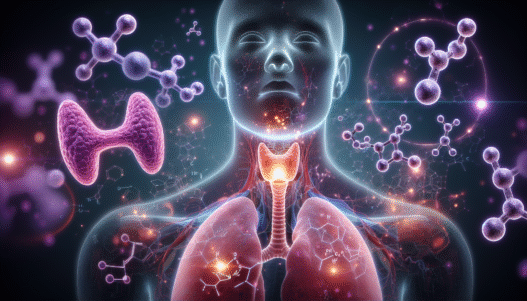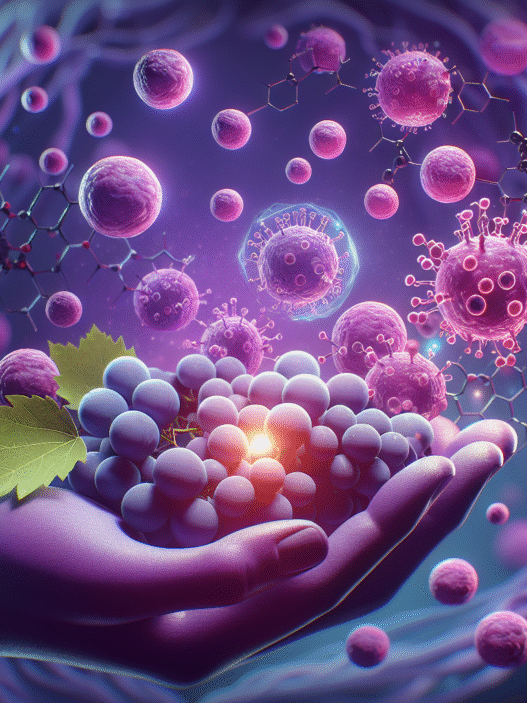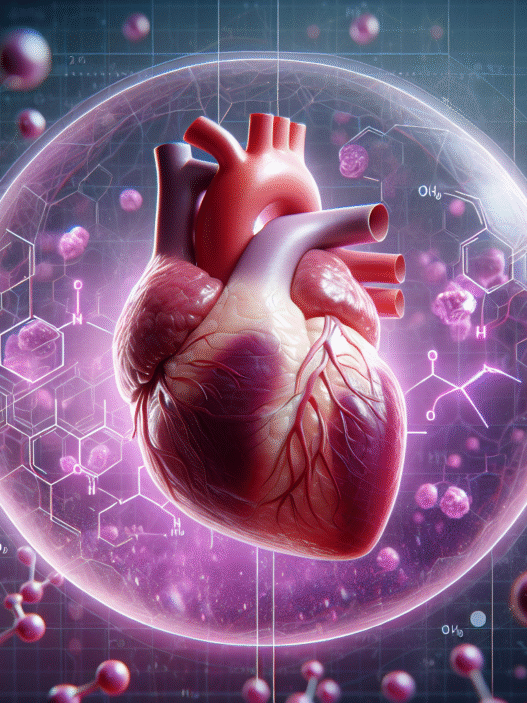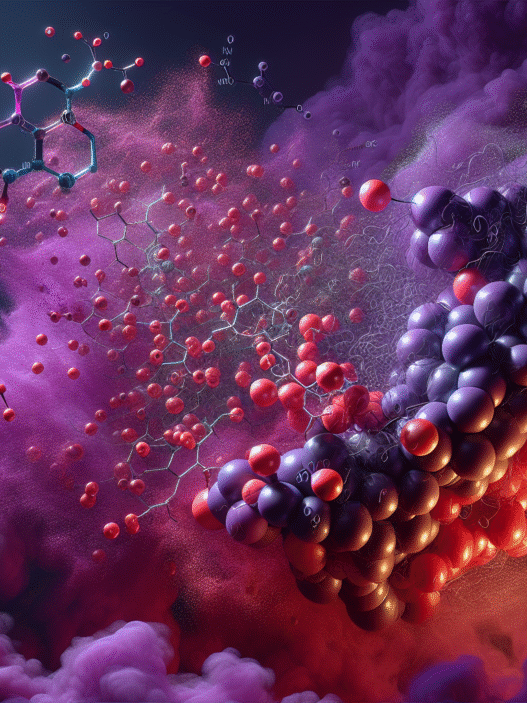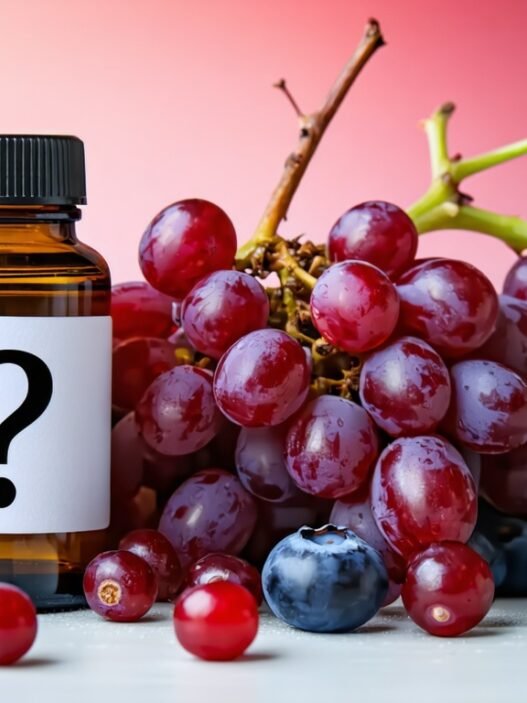Understanding Resveratrol for Health
Resveratrol Overview
Resveratrol is a plant compound recognized for its various health benefits. It has garnered attention in the health and wellness community for its potential antioxidant, anti-cancer, and anti-inflammatory properties. This compound is primarily found in red wine, grapes, some berries, and peanuts, with its highest concentrations located in the skins and seeds of these fruits Healthline. Research has shown that resveratrol is present in over 70 plant species and has been investigated for its pharmacological effects PMC.
Resveratrol’s diverse array of health benefits has made it popular among natural health enthusiasts. Its roles in cardioprotection and neuroprotection, alongside its antimicrobial activity, highlight its significance in holistic wellness approaches.
Sources of Resveratrol
Those seeking to increase their intake of resveratrol can mainly find it in the following sources:
| Source | Resveratrol Concentration (mg/100g) |
|---|---|
| Red Wine | 1.9 – 3.5 |
| Grapes | 0.24 – 1.8 |
| Peanuts | 0.01 – 0.29 |
| Blueberries | 0.05 – 0.15 |
| Cranberries | 0.05 – 0.09 |
Eating foods high in resveratrol can benefit overall health. However, there are debates in the health community regarding whether resveratrol is safe for everyone, particularly in relation to its effects on thyroid health. For more information on potential risks, refer to our article on why is resveratrol controversial and who should avoid it?.
Overall, while resveratrol offers various health advantages, it’s essential to consider individual health circumstances when incorporating it into a diet. Those interested in the impact of resveratrol on different health conditions can check our articles on topics such as is resveratrol bad for the heart? and is resveratrol anti-carcinogenic?.
Resveratrol’s Effects on Thyroid
Resveratrol, a natural compound found in various plants, has garnered attention for its potential impact on thyroid function. Understanding these effects is crucial, especially for those concerned about the question, is resveratrol bad for thyroid?.
Resveratrol and Thyroid Function
Research indicates that resveratrol may have both positive and negative effects on thyroid function. On one hand, it can enhance iodide trapping, leading to increased secretion of thyroid-stimulating hormone (TSH) through the activation of specific pathways like sirtuins and phosphatidylinositol-4-phosphate 5 kinase γ (PIP5Kγ) PubMed.
Conversely, resveratrol has demonstrated anti-thyroid properties as well. Studies show that it can decrease sodium/iodide symporter expression and iodide uptake in thyrocytes. This effect was confirmed in both cell culture and in Sprague-Dawley rats treated with 25 mg/kg of resveratrol for 60 days, resulting in an increase in thyroid size and its proliferative activity PubMed.
To summarize the effects of resveratrol on thyroid function, consider the following table:
| Effect | Description |
|---|---|
| Iodide Trapping Enhancement | Increases TSH secretion and metabolism. |
| Anti-Thyroid Effects | Decreases iodide uptake and sodium/iodide symporter expression. |
| Growth Impact | Increases thyroid size and proliferative activity. |
Resveratrol in Thyroid Cancer
The relationship between resveratrol and thyroid cancer is an area of ongoing research. Some studies suggest that resveratrol may exhibit anticancer activity, potentially impacting the development or progression of thyroid cancer. Resveratrol has been noted for its ability to influence cell proliferation and induce apoptosis in various cancer cells, but comprehensive studies specifically addressing thyroid cancer are still forthcoming. For more information on the anticancer properties of resveratrol, you can refer to our article on is resveratrol anti-carcinogenic?.
The effects of resveratrol on thyroid health require a cautious approach, especially for individuals managing thyroid disorders or those at risk of thyroid-related illnesses. While resveratrol may offer various health benefits, it is critical to consider how it interacts with thyroid function and involve healthcare professionals when incorporating resveratrol supplements into a wellness regimen.
Benefits of Resveratrol Supplements
Resveratrol supplements have gained attention for their potential health benefits, particularly in areas such as cardiovascular health and diabetes management. Understanding these benefits is vital for those considering incorporating resveratrol into their wellness routines.
Health Benefits of Resveratrol
Resveratrol is a compound found in various plants and is particularly abundant in the skin of red grapes. Research has indicated that resveratrol supplements can protect brain function, lower blood pressure, and increase insulin sensitivity. Most studies on the health benefits of resveratrol have been conducted using higher concentrations in animals and laboratory settings compared to typical dietary intakes from food sources (Healthline).
Impact on Blood Pressure
One of the notable effects of resveratrol is its ability to impact blood pressure. Resveratrol supplements can help reduce blood pressure by enhancing nitric oxide production, which allows blood vessels to relax. This effect is especially significant on systolic blood pressure, a critical factor in cardiovascular disease risk (Healthline).
The following table summarizes the effects of resveratrol on blood pressure:
| Blood Pressure Type | Effect of Resveratrol |
|---|---|
| Systolic | Decrease |
| Diastolic | Minimal effect noted |
Role in Diabetes Management
Resveratrol has shown promising benefits for individuals with Type 2 diabetes. Studies indicate that it can increase insulin sensitivity, reverse insulin resistance, and help lower blood sugar levels. It may also lead to improvements in serum lipid (cholesterol) and glucose (sugar) levels (WebMD).
| Diabetes-related Benefit | Description |
|---|---|
| Increased Insulin Sensitivity | Enhances the body’s response to insulin |
| Blood Sugar Regulation | Helps lower and stabilize blood sugar levels |
| Lipid Profile Improvement | Positive effects on cholesterol levels |
Further research is needed to establish the efficacy of resveratrol in treating diabetes and its complications, but initial findings are promising in supporting metabolic health and overall wellness. It is essential for individuals considering resveratrol to consult healthcare providers, particularly if there are concerns regarding thyroid health, as raised by the question, is resveratrol bad for thyroid?.
Potential Risks and Concerns
Consumers interested in the benefits of resveratrol should also consider its potential interactions and risks. While this compound is celebrated for its health benefits, certain groups may need to be cautious.
Resveratrol Interactions
Resveratrol may have interactions with various medications and health conditions. Individuals who have health issues such as bleeding disorders or are taking specific medications are advised to consult a healthcare provider before starting resveratrol supplements. This is due to the potential for resveratrol to produce blood-thinning effects, which may increase the risk of bleeding, especially for those on anticoagulant therapies.
| Health Condition/Medication | Consideration |
|---|---|
| Blood Clotting Disorder | Avoid resveratrol due to blood-thinning effects. |
| Anticoagulants | Consult healthcare provider regarding interaction risks. |
Additionally, it is recommended that individuals halt the intake of resveratrol supplements two weeks prior to any surgery for similar reasons (WebMD).
Risks for Certain Groups
Certain populations should avoid resveratrol due to specific health concerns. Pregnant and breastfeeding women, as well as children, are advised against using these supplements until further high-quality research is available. Additionally, individuals with estrogen-sensitive conditions like endometriosis, uterine fibroids, or certain reproductive cancers should exercise caution. Resveratrol can mimic estrogen in the body, potentially exacerbating these conditions.
For those uncertain about taking resveratrol, exploration of alternative health options may be worthwhile. Questions regarding its effectiveness in other areas, such as its impact on heart health, can be explored in articles like is resveratrol bad for the heart? and the potential anti-carcinogenic properties discussed in is resveratrol anti-carcinogenic?.
Resveratrol Research Findings
Research on resveratrol has gained traction in recent years, focusing on its potential health benefits, including its effects on longevity and various age-related diseases. This section explores clinical studies on resveratrol and its relationship with longevity.
Clinical Studies on Resveratrol
Numerous clinical studies have investigated the effects of resveratrol on health. The compound exhibits a wide range of biological properties, including antioxidant effects, cardioprotective qualities, neuroprotective roles, anti-inflammatory properties, and anticancer activities. These attributes are being studied in various health conditions, showcasing the potential of resveratrol to enhance health outcomes (PMC).
One notable area of interest has been its impact on aging-related diseases. Animal studies indicate that resveratrol may help lengthen lifespan by activating certain genes linked to aging and calorie restriction. However, it remains uncertain whether similar effects can be observed in humans (Healthline).
| Study Focus | Key Findings | Sample Size | Results |
|---|---|---|---|
| Cardiovascular Health | Positive effects on cholesterol and blood pressure | 100 participants | Improved HDL cholesterol levels |
| Neuroprotection | Potential to reduce cognitive decline | 200 participants | Decreased markers associated with Alzheimer’s |
| Aging | Activation of longevity genes | Animal models | Lifespan extension observed |
Resveratrol and Longevity
The association between resveratrol and longevity has generated significant interest. While animal models have demonstrated life-extending benefits through calorie restriction mechanisms, it is still unclear whether humans can experience the same outcomes. The excitement surrounding resveratrol invites further exploration of its efficacy in promoting a longer, healthier life.
For individuals seeking natural health and holistic wellness strategies, resveratrol could be a beneficial supplement. However, it’s essential to consider the ongoing research and consult healthcare professionals when addressing specific health concerns. For further reading on the potential risks and who should avoid resveratrol, visit our article on why is resveratrol controversial and who should avoid it?.
Resveratrol as an Antioxidant
Resveratrol, a natural compound found in various plants, is gaining attention for its antioxidant properties. These properties combat oxidative stress, which can lead to cell damage and contribute to various diseases and aging processes.
Antioxidant Properties of Resveratrol
Research indicates that resveratrol effectively scavenges free radicals and possesses notable antioxidant effects. This function helps protect cells from oxidative stress induced by harmful substances, such as hydrogen peroxide. By maintaining cellular redox balance, resveratrol supports overall cellular health and plays a role in preventing the onset of various chronic conditions (PMC).
| Property | Effect |
|---|---|
| Free Radical Scavenging | Reduces oxidative stress on cells |
| Cellular Protection | Shields cells from damage caused by toxins |
| Redox Balance | Maintains stable cellular environments |
Anticancer and Antimicrobial Effects
Resveratrol exhibits promising anticancer effects by interfering with multiple stages of carcinogenesis: initiation, promotion, and progression. It activates mechanisms such as cell cycle arrest, differentiation, apoptosis, and anti-proliferation in cancer cells. These properties make resveratrol a potential candidate for cancer prevention and treatment (PMC).
In addition to its anticancer benefits, resveratrol has demonstrated antimicrobial activity. It has shown effectiveness against a variety of pathogenic microorganisms, including both Gram-positive and Gram-negative bacteria, fungi, and viruses. Key pathogens that resveratrol can inhibit include:
| Microorganism | Type |
|---|---|
| Candida species | Fungi |
| Campylobacter | Bacteria |
| Arcobacter | Bacteria |
| Pseudorabies virus | Virus |
| Staphylococcus aureus | Bacteria |
These capabilities underscore the potential of resveratrol in combating microbial infections and highlight its versatile health benefits.
For more insights on resveratrol’s potential risks and interactions, see our article on why is resveratrol controversial and who should avoid it? as well as questions surrounding its effects on other health aspects like heart health and aging.










